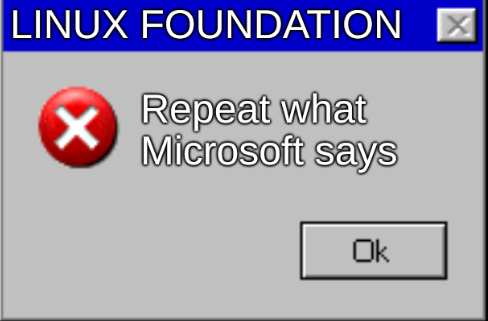

THE Daily Links in this site habitually add some "Ed"(itorial) comments to highlight FUD (Fear, Uncertainty, Doubt/fear-mongering) and offer some quick response to it. How much can publishers lie for the likes of Microsoft or VMware before those publishers perish due to a lack of credibility and, in turn, a lack of audience?
"The real "supply chain" trouble is Microsoft and proprietary software..."In this post we highlight 3 recent patterns we've noticed. They are semantic lies.
Recently, a Microsoft front group called "Linux Foundation" kept using terms like "supply chain". Years ago nobody used this term in relation to Free software and then Microsoft bought a lot of the so-called 'supply chain', in the form of GitHub and then NPM. Would anyone trust the integrity of code and binaries from a platform controlled by Microsoft and the NSA, whose CSO is a decades-long NSA veteran?
The real "supply chain" trouble is Microsoft and proprietary software; you can't audit what you're getting and it might be intentionally back-doored, taking advantage of this opacity. So why pretend this is a "FOSS" issue?
"If something was fixed or was already patched upstream before disclosure, then it is not a 0-day."Speaking of back-doored code or executables, "backdoor" means not a backdoor anymore. Microsoft-controlled media distorted the term and kept mentioning it in false contexts. Nowadays it just means a server got compromised and then the person who took control of it installed some more stuff. But that's malware and it says nothing about how the malware got on the system in the first place (unless there was an actual back door).
Many would say that servers can be hijacked using critical and remotely-exploitable flaws, set aside bad passwords (those are typically a human failure). But that leads us to the distortion of the definition of "zero day" (or 0-day). If something was fixed or was already patched upstream before disclosure, then it is not a 0-day. If it starts getting exploited the moment it is disclosed, then it's a "1-day". But looking around the Web today, we found several examples of lies to that effect. The media keeps badmouthing Zimbra, but this seems to be a way to distract from several critical Microsoft flaws, including those affecting Exchange. Those are actively being exploited, according to a very recent report. the Zimbra issue is old news (about a month old) and servers have already been patched by responsible administrators, such as my colleagues. Although it seems like the Zimbra hole might be a new one, the last patch partly addresses it. Do not forget that CISA released a list with three Microsoft holes that are actively exploited, including in Exchange, so why shift/divert to talking about Zimbra rather than Exchange? Are they trying to reinforce some false perception that moving away from Exchange would mean equally bad or even worse security?
"The scenario, as per Dan Goodin et al (even sued for defamation already, for utterly poor reporting on security), is nowhere as grim as the Microsoft Exchange situation."What's bothersome here is the repeated distortion of the term "zero day". An associate told us that "'they' must be really worried about the advance of FOSS to spread so much dated FUD about Zimbra and other projects. One giveaway is the use of the marketing phrase "zero-day". That used to mean an exploit that was in active use before the vendor admitted to it existing. Now it just means bug with an exploit."
The scenario, as per Dan Goodin et al (even sued for defamation already, for utterly poor reporting on security), is nowhere as grim as the Microsoft Exchange situation. We already saw that Microsoft goes on for months and months without patching known Exchange flaws, even when it is fully informed that such flaws are actively being exploited already.
Zimbra does E-mail, so that helps distract from what Microsoft is doing, with the real zero days, the real back doors, and the real supply chain crisis. Microsoft monopolises this chain (it's proprietary) and refuses to fix it, leaving the victims helpless. This must be intentional. Or as out associate put it, "paid-for back doors on behalf of those that pay enough, or more specifically bug doors. Those are exploitable bugs about which the payers are informed long in advance of Microsoft getting around to patching them."
"Zimbra does E-mail, so that helps distract from what Microsoft is doing, with the real zero days, the real back doors, and the real supply chain crisis."It's the Windows [sic] of opportunity... Edward Snowden has already provided ample evidence of this. Microsoft keeps giving the NSA and FBI enough time to install a RAT or bootkit before the patches get deployed (too late). "And the FSB and just about any similar agency in all the other Internet-connected countries in the world," our associate noted.
So we're meant to think that the real crisis is Free software and Microsoft lobbyists then push for new, discriminatory laws that stigmatise "Open Source". New zero-day in Microsoft products? Unpatched for months while exploits circulate for months? So the Microsoft shills focus on the something that is "open source"... and repeat endlessly the terms which aren't even applicable to it.
"CISA is a Microsoft reseller working out of the DHS offices," our associated concluded, "which itself is a fraud." ⬆